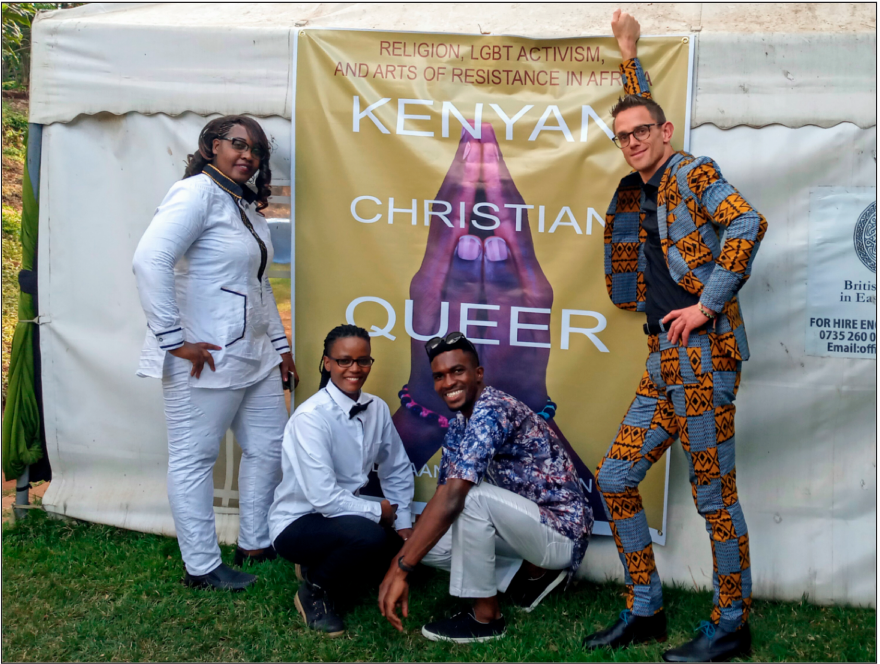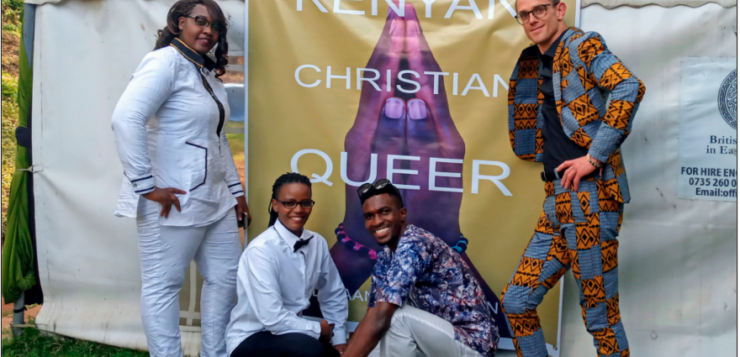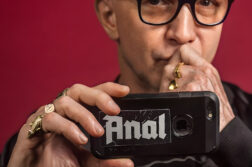ADRIAAN VAN KLINKEN describes himself as someone who “has had enough with discourses on religious homophobia, and prefers concentrating on the other side of the coin where religion can actually advance the human rights cause in Africa.” He teaches Religion and African Studies at Leeds University in England, and his work focuses on religion (especially Christianity) and public life in Africa, with a focus on gender and sexuality. He was a fervent Christian believer in his youth who now describes himself as a progressive Protestant attending an LGBT-affirming Anglican church. Born in the Netherlands, van Klinken is a happily married gay man who has disclosed publicly that he’s living with HIV.
Van Klinken recently published an insightful book, Kenyan, Christian, Queer: Religion, LGBT Activism, and Arts of Resistance in Africa. The book elaborates how LGBT Kenyans find ways to reconcile their sexuality with their religious beliefs, focusing on how religion helps them to reclaim their “Africanity” and “Queer Christianity.” He also discusses the importance of art and other forms of creative expression by Africans as a form of resistance in contemporary African contexts. As he analyses various case studies, he also writes about his personal experiences as a researcher.

Emmanuel Munyarukumbuzi: How can religion be a source of LGBT activism in Africa, as you assert—a terrain for “renegotiation,” “queer possibility,” “affirmation” and “resistance”?
Adriaan van Klinken: Of course we all know that religious beliefs are a key driver behind homophobic attitudes in Africa and across the world, and that religious leaders and institutions often fuel homophobia. But over the past twelve years of doing research in various parts of Africa, I also realized that many LGBT people are deeply reli-gious. In some cases they may have stopped going to church or mosque, but they still believe in God and find ways to combine and reconcile their sexuality and their faith. I also learned about religious leaders who actually support LGBT people, and religious communities that offer a space to them. And I discovered that LGBT activists engage with religion in creative ways as part of their advocacy. Thus, “religious homophobia” is only one side of the coin, and in my book I wanted to turn the coin around and look at the other side.
As a scholar of religion, I know that religious beliefs and practices can be used, and are being used, for different ends; his-tory is full of examples. For instance, the Bible was used to justify slavery, but slaves in their turn appropriated the Bible and expressed their faith and hope in powerful gospel spirituals. I believe that the same is the case with homophobia in Africa, with many LGBT Africans reclaiming their faith and resisting homophobic religious leaders by expressing their belief in God who cre-ated them the way they are, including their sexuality, and expressing their belief in a loving God.
EM: Please share with us where your interest in Africa and African contemporary religion came from.
AvK: As a mzungu (white person) from Europe working in and on Africa, I’m aware that my work is part of a long and often painful and problematic history of European engagement with African people, cultures, and societies. African Studies as a field has a colonial history and is still practiced in ways that sometimes reflect that. I have no easy solutions, but I try to address this problem by doing my research in a way that is respectful and doesn’t just serve my own career but also the interests of the com-munities I work with. I try to invest in long-term partnerships and friendships as the basis for research collaboration.
My initial interest in religion in Africa was sparked when I was a student at university myself. I had a lecturer who had worked in West Africa for many years and shared her passion. She encouraged me to study for a semester in South Africa, in 2006, which was my first encounter with the continent. It was a challenging ex-perience, as it forced me to think about questions of race and my own whiteness. It also confronted me with the reality of the HIV epidemic, which was at its height at that time. During that period, I discovered something that I hadn’t seen in Europe, where I grew up in one of the most secularized countries in the world. I discovered how religion was integral to people’s everyday lives, how it played a prominent role in society, how it shaped social and political attitudes, and how it was a force of change, for better or worse. That’s where my academic interest in religion in Africa started, and from there it developed in ways that I could then not have foreseen.
EM: What about your interest in African male bodies and African fashion?
AvK: You are right, there’s much more that interests me about Africa than just religion. I love the food, fashion, music, and litera-ture coming from different parts of the continent. I feel more alive when I’m there because of the sunshine, the laughter, the energy, the humor, the spirit of life. I gen-erally find African people—including, but certainly not only, their bodies—beautiful. Saying so runs the risk of exoticizing Africans through a Western gaze—a risk I try to address by foregrounding that what-ever our differences, we share a common humanity, an embodied existence. In my book, I try to avoid this exoticizing gaze by also turning the gaze towards myself, re-flecting on my own life experiences and identity in relation to the subjects I write about.
EM: What were your main objectives in writing Kenyan, Christian, Queer: Religion, LGBT Activism, and Arts of Resistance in Africa?
AvK: Simply put, I wanted to tell a different story about LGBT lives and activism in contemporary Africa. I was tired of the widespread narratives of “African homophobia” and “religious homophobia.” Without denying that these narratives have elements of truth, they are one-sided, and I wanted to counter-balance them by telling another story: about how LGBT people, in this case in Kenya, organize themselves, create a space, and make themselves heard. And I wanted to foreground how religious language, symbols and beliefs are creatively used in that dynamic.
EM: What do you hope people will get out of this book—and please make a distinction between believers and nonbelievers, and also between queer and non-queer readers. What about the global black queer community?
AvK: It’s always a surprise what people get out of something you write. But I hope that the book helps to challenge and enrich people’s understanding of the subject. For people who are religious believers, it may make them aware of the different ways in which religion can be interpreted and used—religion is constantly open to dispute and creative appropriation. For people who are non-believing, the book may give them a more nuanced insight into how faith operates in people’s lives and in society—not always as a conservative and oppressive force, but also as a possible source of resistance, liberation, and empowerment.
For queer people outside of Africa, the book will challenge their idea that queer Africans are victims of social, political, and religious homophobia. It will make them aware of the resilience, power, and creativity in African queer lives. For non-queer people, I hope the book will strengthen their sense of solidarity, be-cause regardless of our sexuality and gender identity, we are all human beings whose dignity and rights deserve to be affirmed.
Emmanuel Munyarukumbuzi is an academic and writer based in Rwanda.






Discussion1 Comment
I love Adriaan I am one of his proud students. He has so much energy and insights and yet he writes from a place of vulnerability which I find very inspiring.